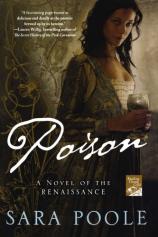Reading Group Guide
Discussion Questions
Poison: A Novel of the Renaissance

1. Francesca Giordano lives at a time when civilization is being revitalized by new perceptions and ideas that threaten the existing power structure. How does the struggle between the two shape this story and the challenges that Francesca faces?
2. Over the course of this story, Francesca kills at least twice and possibly three times. Can her actions be justified morally?
3. While she yearns for the glassmaker, Rocco and the life she could have had with him, Francesca does not hesitate to pursue a relationship with Cesare Borgia that is sexual and more. Is she hypocritical in having feelings for both men or is she drawn to each for different reasons?
4. Francesca has a complex relationship with her employer, Cardinal Rodrigo Borgia. How much do you think the Cardinal knows about Francesca’s past? What role may he have played in the murder of her father?
5. In modern terms, Francesca suffers from post-traumatic shock related to an event early in her life. In a time before psychoanalysis, she can understand her condition only as the act of a supernatural agent, either God or the Devil. What factors in her life may prompt her to look elsewhere for the true cause of her distress as well as the path to resolving it?
6. The discovery that her late father was a “converse,” a convert from Judaism to Christianity, shocks Francesca and makes her question what else he concealed from her. But it also opens her to new perspectives and relationships. Is the uncovering of hidden truths always beneficial or are there times when secrets should remain unspoken?
7. Francesca regards the priest Bernando Morozzi as the embodiment of evil yet she also fears that they are alike in some ways. Is she right in either regard? In both?
8. Lucrezia Borgia is depicted very differently in this story from much of what has been written about her. Why do you think she has been portrayed in such dark terms historically? Did being a woman make her more vulnerable to exploitation by her family’s enemies?
9. As Rodrigo’s son, Cesare Borgia has access to great power yet he cannot use it to claim the life he truly wants. What acts might his frustration give rise to?
10. Throughout this story, poison appears as a metaphor for the stain of corruption running through the highest levels of society. Is a similar metaphor appropriate in our own time and if so, where?
11. What role do you think the corruption of the popes and other high-ranking prelates of this time played in triggering the rebellion against Catholicism that we know as the Reformation? Were there internal reforms the Catholic leadership could have taken that might have prevented the Reformation from happening?
12. If Rodrigo Borgia’s dream of a papal dynasty controlled by his family had succeeded, what would have been the implications for his time? For ours?
Poison: A Novel of the Renaissance
- Publication Date: August 3, 2010
- Paperback: 416 pages
- Publisher: St. Martin's Griffin
- ISBN-10: 0312609833
- ISBN-13: 9780312609832







